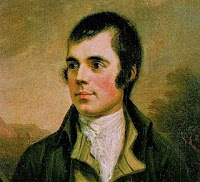 |
| Conversion of St. Paul, Cranach the Younger |
 |
| Robert "Rabbie" Burns |
Burns Night is a beautiful example of a traditional cultural event that ought to be baptized into the Church by any Catholic Scot or in fact any Catholic open to wearing a kilt. Perhaps at first glance Robert Burns and his night are not likely candidates for baptism. The son of a strict Presbyterian Scotland, Catholicism was something foreign to him, although perhaps not because he was himself a faithful member of the kirk. Indeed, many a fervent minister had it out for Robbie, as did several of the parents of their parishes: seven of Robbie's twelve children were illegitimate. Sinner. Yes, that is exactly what the Presbyterians thought too. Luckily, Burns had the good fortune to be born on January 25th, the Feast of the Conversion of Saint Paul, so as to disallow us from thinking too poorly of him. St. Paul had a bad habit of killing and imprisoning Christians before Christ saw fit to knock him off his horse and blind him into conversion. Good things are Catholic. Christ has a tendency of claiming them for his own.
So what does Burns have that is good, that is worth claiming? It is interesting that one of Robbie's early fans was the Catholic Bishop of Dunkeld, Dr. John Geddes. Indeed, the bishop made sure that five Catholic seminaries were sent publications containing Burn's poetry. What is it that Bishop Geddes saw in Burn's poetry that made him believe that it would somehow be helpful to the formation of his priests? Without a doubt, the Bard's poetry is as different from the stark Presbyterianism as the poet was himself. Filled with an innate sense of hope, joy, an appreciation for (usually feminine) beauty, a sensitivity for the delicate and imbued with strong sense of honor, Burn's poetry gleams brightly in a pre-Romantic, 18th Century Scotland. "To a Mouse" for instance, illustrates a unique Burnsian gentleness. His "Mans a Man for a That" cherishes the innate good of mankind. His Jacobite verses, wistfully recalling the Catholic Stuart monarchy whose dreams had perished at Culloden, express the soul of nobility. At any rate, if we still have difficulty entirely embracing the man, his supper ought to be an entirely different matter. A night of poetry, feasting and toasts: what could be more Catholic?
Speaking of good Catholic toasts, while Scotch is the official drink of Burns Night, Atholl Brose is a fanatastic supplement to any good Scottish festivity. An ancient drink developed by the Duke of Atholl in the 15th Century, it was first crafted as a tool of war. Iain Macdonald, Lord of the Isles, was raising a great highland rebellion, which the Duke of Atholl was attempting to quell. The Macdonald held a well fortified position and Atholl was in dire need of reinforcements. Although poisoning water the water hole is as old as warfare itself, the Duke put his own signiture spin on the tactic: he dumped oatmeal, honey and whisky in the well. Not only did this contaminate the well but it inebriated the rebels and gave them a false sense of security. Having bought the time he needed for reinforcements, as the enemy drank and were merry, Atholl dispatched the enemy with ease. Here is a recipe from the fantastic book Strong Waters by Scott Mansfield for this warlike drink:
Ingredients:
1 cup old-fashioned rolled oats
3 cups water
1/4 cup (3 ounces) honey
1 cup whipping cream
2 cups Scotch whisky
1.) Put the oats in a nylon straining bag and place the bag in a deep bowl. Add the water and let the oats steep overnight.
2.) The next morning, squeeze the water out of the bag. Put the liquid in the saucepan, add honey, and heat gently until the honey dissolves.
3.) Stir in the cream, then add the whisky.
4.) Refrigerate until cool before serving. The beverage will keep in the refrrigerator for a couple months, or in the freezer indefinitely.
Slainte Mhath, Here tae ye!
No comments:
Post a Comment